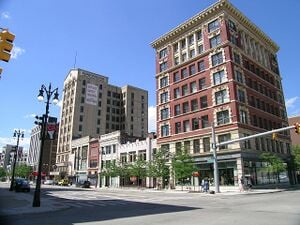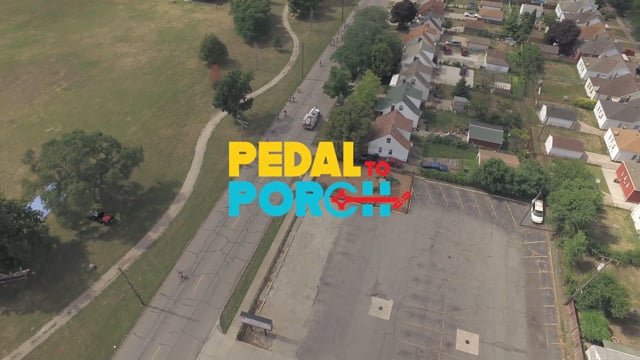The aim of this page is to recognise, celebrate and encourage the self-empowerment of community agency networks (CANs) and community groups across Detroit.

- Eco-friendly 'green' district launched in Detroit, Jun 7, 2017...[1]
- Detroit Imagines a Citizen-Led Smart City, May 31, 2017...[2]
- Public, not private, interests now rule riverfront plan, Mar 11, 2017...[3]
Networks and sustainability intiatives[edit | edit source]
Open spaces[edit | edit source]
Detroit RiverFront Conservancy
Trees, woodland and forest[edit | edit source]
The Greening of Detroit is a 501(c)(3) non-profit environmental organization whose mission is to inspire the sustainable growth of a healthy urban community through trees, green spaces, healthy living, education, training and job opportunities. The Greening serves communities in Detroit, Highland Park and Hamtramck, Michigan.
Community involvement[edit | edit source]
Lower Eastside Action Plan, Detroit. Community-driven project designed to engage people in a process to transform vacant land and property into uses that improve the quality of life in our neighborhoods and surrounding areas. LEAP on facebook
Cycling activism[edit | edit source]
- Detroit Greenways Coalition, Advocating for better bicycling and trails since 2007
- Slow Roll Detroit
- Let's ride, Detroit, MoGo, Metro Detroit's non-profit bike-share organization
Detroit is a popular city for cycling. It is flat with an extensive road network with a number of recreational and competitive opportunities and is, according to cycling advocate David Byrne, one of the top eight biking cities in the world. The city has invested in greenways and bike lanes and other bicycle-friendly infrastructure. Bike rental is available from the riverfront and tours of the city's architecture can be booked.
The city has a strong cycling heritage, and first embraced cycling during the "golden age" of the 1890s.
Cycling Maps
- SEMCOG publishes various walking and cycling maps including the Southeast Michigan Regional Map for the region around Detroit.
- OpenStreetMap offers a cycling map view for the city and elsewhere.
- Google Maps also offers a cycling map view for the city and elsewhere.
- The Detroit Greenways Coalition has an on-line Detroit Bike+Parking Map, which is the Google cycling map overlaid with bike parking locations. W
Food activism[edit | edit source]
City Commons, cooperative of Detroit farms - Detroit Black Community Food Security Network - Detroit Dirt, compost company working to turn forgotten parcels of land in Detroit into urban farms that not only feed, but revitalize community - Detroit Food Policy Council - Earthworks Urban Farm
Reduce, reuse, repair and recycle[edit | edit source]
Sharing[edit | edit source]
Maps: Detroit Solidarity Economy v2
Sustainable transport[edit | edit source]
The QLine (stylized as QLINE), originally known as M-1 Rail by its developers, is a 3.3-mile-long (5.3 km) streetcar system in Detroit, Michigan, United States. Opened on May 12, 2017, it connects Downtown Detroit with Midtown and New Center, running along Woodward Avenue (M-1) for its entire route. The system is operated by M-1 Rail, a nonprofit organization.
Resources[edit | edit source]
Apps for sustainability[edit | edit source]
Detroit SeeClickFix, for reporting community issues to the city
Citizens data initiative[edit | edit source]
DetroitData, Collaborate, compile, and share open data for effective community-based decision making in Detroit.
About Detroit[edit | edit source]
In the 2010s, several initiatives were taken by Detroit's citizens and new inhabitants to improve the cityscape by renovating and revitalising neighbourhoods. Such include the Motor City Blight Busters W and various urban gardening movements. W
Planning and development in Detroit includes efforts aimed at enhancing Detroit's economy and quality of life. In 1970, the private group "Detroit Renaissance" began to facilitate development in the city, while its successor, Business Leaders for Michigan, has continued to facilitate development into the 21st century. Projects have included new commercial facilities, revitalization of neighborhoods, hospitality infrastructure, and improvements to recreational and public facilities, such as the QLine. W
References



